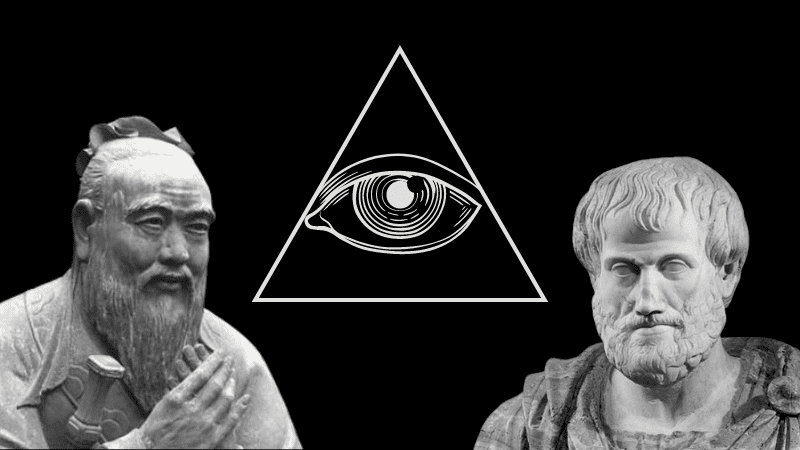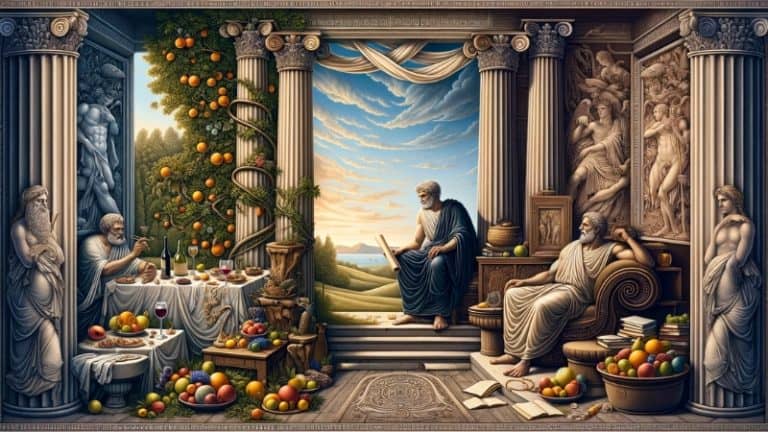Which Philosophers Believed in God? A Look at the Evidence
Philosophy and religion have been closely intertwined throughout history. Many great philosophers had strong opinions on religious issues, and some even believed in God. In this article, we will examine the thoughts of some famous philosophers on the subject of religion. We will also examine the evidence they used to support their beliefs (or lack thereof).
One of the most famous philosophers of all time, Socrates, believed in God. He believed that the gods were responsible for everything that happens in the world. Socrates even went so far as to say that it was impossible to be good without believing in God. Other famous philosophers who believed in God are Plato and Aristotle, Thomas Aquinas, Descartes and Leibniz.
Philosophers who did not believe in goodness include Arthur Schopenhauer, Friedrich Nietzsche, and Jean-Paul, who held an atheistic view.
This article will deal with different philosophers and their views. It will also provide some background information for better understanding. It will be beginner friendly. Promised.
First of all, we should talk about why a philosopher can talk about religion without being a theologian. A philosopher is someone who uses reason and logic to examine ideas. They are not necessarily experts in a particular field, but they have the ability to think deeply about complex issues. This means that philosophers can look at religious ideas from a different perspective than theologians. Philosophers are also more likely to question religious beliefs than people who simply take them for granted.
What is the difference between a philosopher and a theologian?
A philosopher is someone who uses reason and logic to explore the nature of reality, while a theologian is someone who studies religion and God. Philosophers who believe in God usually base their beliefs on evidence from the natural world, while theologians may base their beliefs on Scripture or religious experience. Philosophers who do not believe in God usually think that religion is a means by which people can control others, while theologians may think that atheists are simply missing out on an important part of life. Philosophers usually focus on theoretical concepts, while theologians may focus on the practical application of religious beliefs. However, both groups, philosophers and theologians, have strong evidence for their beliefs.
Now let's take a closer look at some of the most famous philosophers who ever lived:
Did Socrates believe in God?
Socrates believed in God. He believed that the gods were responsible for everything that happens in the world. Socrates even went so far as to say that it was impossible to be good without believing in God.
Where did Socrates state his belief in the gods?
Socrates explained his belief in the gods in several places. In the dialogue Timaeus, he has Socrates say that the Demiurge (a creator god) created the world from eternal matter. Also, in the dialogue Crito, he says that it would be wrong to disobey God's laws, even if they are unjust. Finally, in the dialogue Euthyphro, Socrates says that it is impossible to be good without believing in God. All these statements show that Socrates had a firm conviction about the role of the gods in the world. Philosophers who believed in God used various kinds of evidence to support their beliefs. Some, like Socrates, based their beliefs on ethical considerations. Others, like Plato and Aristotle, believed that the universe itself was evidence for a creator God. Regardless of what kind of evidence they used, it is clear that belief in God was an important part of the lives of many famous philosophers.
Looking for more about Socrates? Check out one of our articles about him. He treats everything you need to know to become more satisfied.
Where does it say that Plato believed in God?
There are indications that Plato did not believe in God, but had a polytheistic conception. Only the Christians based their understanding of God on what Plato had described as the good - which is the cause of knowledge and truth and thus lies beyond knowledge and truth (Source).
But even he did not have the classical conception of the gods. According to Plato, gods could not do harm, nor did they have qualities that would be ridiculous in them, namely human-like behavior such as jealousy and anger. Plato reformed polytheism rather than abolishing it.

Where did Plato state his belief in the gods?
Plato stated his belief in the gods in most of his works. In The republic For example, he speaks about the divine nature of the world (called the good).
If you want to read more about Plato, you can read this article in which Luke gives the famous quote "Death is not the worst thing that can happen to man"..
What is the difference between ethical reasoning and other types of evidence?
Ethical reasoning is based on moral principles, while other types of evidence are based on observation or reason. Philosophers who use ethical reasoning to support their beliefs about God think that it is morally good to believe in God. They may also think that it is impossible to be a good person without believing in God. Philosophers who rely on other kinds of evidence may think that the universe itself is evidence for a creator God.
Some, like Socrates, based their beliefs on ethical considerations. Others, like Plato and Aristotle, believed that the universe itself was evidence of a creator God. Regardless of what kind of evidence they used, it is clear that belief in God was an important part of the lives of many famous philosophers.
What did Aristotle think about God?
Aristotle believed in a creator God. He believed that this God was responsible for the organization and movement of the universe. His evidence for this belief was based on the fact that the universe is orderly and there must be a reason for this orderliness. Philosophers who believed in God used different kinds of evidence to support their belief.

Where did Aristotle say that he believed in God?
Aristotle pointed to God in several places. Aristotle comes for example in the Metaphysics concluded that the unmoved mover is God. The unmoved mover is also known as Actus Purus - the first actualizer in the chain of things that brings about change. The unmoved mover is the one who has the potential to be changed (because otherwise he would need another actualizer to reach his potential). Therefore, God is. Aristotle, however, cannot be considered a proto-monotheist. In his works he speaks of gods, and in his last will and testament Aristotle asked that statues be dedicated in his name to three gods.
Did Gottfried Leibniz believe in God?
Gottfried Leibniz was one of the most impressive German thinkers. And he actually believed in God. He believed that this God is the reason for the existence of good and evil. Philosophers who believed in God used different kinds of evidence to support their beliefs.
Where did Gottfried Leibniz state his belief in the gods?
Gottfried Leibniz stated his belief in the gods in several places. For example, he pointed out that the reasoning of Descartes (implicit in the Fifth Meditation and explicitly in the first sentence of the answers) is erroneous. Descartes had argued that God is a being who possesses all perfections, existence is a perfection, therefore God exists. Leibniz completed the equation necessary to argue that God exists:
- God is a being who has all perfections. (definition)
- A perfection is a simple and absolute property. (definition)
- Existence is a perfection.
- If existence belongs to the essence of a thing, then it is a necessary being.
- If it is possible for a necessary being to exist, then a necessary being exists.
- It is possible for a being to have all perfections.
- Therefore, a necessary being (God) exists.
I have this here found if you're looking for some heavier reading on the subject.
Did Descartes believe in God?
As indicated above, Descartes believed in God.
Descartes is another philosopher. He is best known for his philosophical work Meditations on First Philosophy. In this book, Descartes argues that it is impossible to know with certainty whether God exists or not. And even if God does exist, we cannot know anything about him. Descartes believed that the existence of God is beyond human understanding.
Did Thomas Aquinas believe in God?
Since he was a medieval saint, the answer seems clear. And yes, he did believe in God. But there is more to it than that. He lived in the 13th century and did something remarkable.
He showed how we can reconcile religion and science, or faith and reason.
Aquinas succeeded in establishing in Europe the idea that every human being, not only a Christian, can have access to great truths. This, in his opinion, was done with the help of reason, which he saw as God's gift to mankind.
In short, Aquinas universalized intelligence.
His continuing interest in reason was no accident, for he had studied at the University of Naples. There he came into contact with the rediscovered texts of ancient Greek and Roman authors.
Did you know...
...that Thomas Aquinas is the Catholic "patron saint of teachers"?
During his studies, Thomas Aquinas found that some of the world's greatest thinkers were not Christians and yet had tremendous insights into the world and the nature of things. He found that this was because the world can be explored through reason and not just through faith.
Aquinas proposed as a model that the universe with all its dynamics operates according to two types of laws:
- Natural law
- Eternal Law.
Aquinas believed that in some situations, God could be seen through the eternal law works outside of human reason. He referred to prophetic revelations and the visits of angels as examples.
But he assured us that the most useful knowledge can be found even by atheists and secular-minded people - in the realm of the Natural law.
He made it clear that we should always gain our knowledge from several sources. For example, from intuition, but also from rationality. Or from science, but also from revelation. From pagans and monks.
Where did Thomas Aquinas set forth his belief in the gods?
Thomas Aquinas stated his belief in God in all the books he wrote. And that is saying something, considering that we are talking about almost 200 works on Christian theology in about three decades.
Two of his most famous books are the Summa Theologica and the Summa Contra Gentiles.
Did Averroes believe in God?
The philosopher Averroes lived in Cordoba in the 12th century. He is best known for his commentaries on the works of Aristotle.
He was an Aristotelian whose teachings demonstrated that religion and philosophy need not be in conflict.
As most of the Islamic caliphates in Spain, Morocco, and Egypt ceased to flourish because they were open to knowledge from around the world, their wealth of new scientific ideas and philosophies dried up. This was largely due to the increasing influence of fanatical religious leaders. By the time of Averroes, Islam had become even more dogmatic and oppressive. He reacted violently against it.
The caliphates rejected Averroes' views and saw to it that Averroes' ideas were banned and his books burned.
Like Aquinas, Averroes was strongly influenced by Aristotle and held that reason and religion could be compatible.
Did Alan Watts believe in God?
You may have read a lot about Alan Watts on our blog, but you may not know that he was a philosopher who also believed in God. He believed that everything in the universe is connected and that there must be some ultimate force responsible for that connection. Alan Watts used many different pieces of evidence to support his belief in God, including the argument from design. This argument states that the universe is too complex and orderly to have been created by chance. Therefore, there must be a God who created it.
However, Alan Watts makes it very clear that he distances himself from the traditional Christian faith. Instead, he leans much more toward what is called "the Tao," an impersonal force that governs the universe. If you want to learn more about Daoism, check out our articles on Lao Tzu and others.

Some people say that Alan Watts did not believe in God and was therefore an atheist. This also seems to be true, but actually does not contradict my previous statement, because he pointed out that religion was a way for people to control others - which he actually rejected. He also felt that it is not possible to know whether there is a God or not. As mentioned earlier, he liked better the idea that there is a cosmic energy that could be considered as God, but definitely not in the conventional religious way.
If you want to know who and how Alan Watts really was check out this article.
What about atheists?
There have been many great philosophers who have not believed in God. Some philosophers are even outspoken atheists. Philosophers like Jean-Paul Sartre and Friedrich Nietzsche believed that there is no evidence for the existence of God. They believed that the idea of God was invented by humans to make sense of the world.
Sartre even went so far as to say that belief in God was an escape from responsibility. He is best known for his philosophical work, but he also wrote extensively on atheism. In one of his most famous works, "Existentialism is a Humanism," Sartre argues that there is no such thing as God or life after death. He believes that people are responsible for their own actions and that they should not expect to be rewarded or punished after death.
Did Spinoza believe in God?
Baruch Spinoza did not believe in God. Spinoza believed that belief in God is based on superstition and fear because people are afraid of the unknown.
Why did Spinoza believe that belief in God is based on superstition?
He believed that people only believed in God because they were afraid of what might happen if they did not believe in God. Jean-Paul Sartre and Friedrich Nietzsche were also atheists who believed that belief in God was based on fear and superstition.
Many other famous philosophers did not believe in God. One of the most famous atheists was Voltaire. Voltaire believed that religion was nothing more than a means to control people. Voltaire believed that reason, not faith, should guide actions.
Philosophers who believed in God usually based their belief on evidence from the natural world. They believed that the universe was ordered and that there must be a reason for this order. Therefore, they believed in a Creator God who was responsible for this order. Philosophers who did not believe in God usually thought that religion was a means by which people could control others, or that there was no evidence of His existence. Therefore, they did not believe in God. However, both groups of philosophers had strong evidence to support their beliefs.
Of course, there are also philosophers for whom we simply do not know exactly whether they believed in God or the gods. An example of this? Here you go:
Did Lao Tzu believe in God?
There is no evidence that Lao Tzu believed in God. He was a Taoist philosopher and did not believe in any gods or goddesses. Instead, he believed in the Tao, which is the natural order of things. He believed that people should go with the flow and not try to control everything. It is therefore likely that he did not believe in God because he believed that people should not try to control the natural order of things. However, this is only speculation and we cannot be sure whether he actually believed in the Tao or not. Philosophers who believed in God usually based their belief on evidence from the natural world.

However, if we apply a more abstract concept of God, we could say that Lao Tzu believed in God. Nature is the force of all life (and death) that irresistibly governs the universe and is therefore divine.
Want to learn more about the Dao of Lao Tzu? Check out this article about Letting go and realizing your own potential an.
You see, being a philosopher does not automatically mean having an atheistic view. But the opposite is not automatically the case either.
As a rule of thumb, one can say that ancient Western philosophers usually (but certainly not always) believed in God(s), while Eastern philosophers were more skeptical about the existence of gods. This is probably due to the differences in belief between these two regions. On our blog, we often talk about how Western cultures are mainly based on the idea of creationism, while Eastern (and especially Far Eastern) philosophies usually base their understanding of things on things happening by themselves. If you are interested in this topic, a sample article is this one on the art of not forcing things.
Did you like this article? You can let us inform you about new articles:







